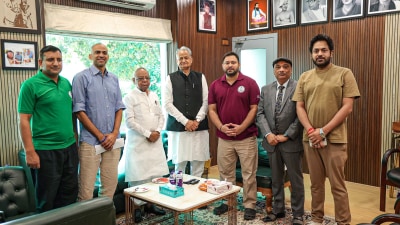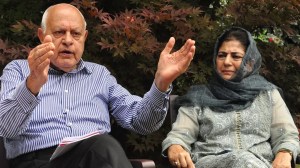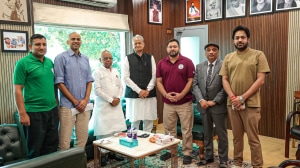Behind brave faces: One took 8 bullets, another lost an eye
His left hand still in a cast and bandages all over his torso, this 26-year-old NSG commando hasn’t lost his determination.

His left hand still in a cast and bandages all over his torso, this 26-year-old NSG commando hasn’t lost his determination. “Chupke se waar kiya, warna sab terrorist ko chun chun ke marta (they crept up and attacked, otherwise I would have killed each one of them),” says Sunil Kumar Jodha, who was an escort to the late Major Sandeep Unnikrishnan.
Jodha didn’t count how many bullets were fired at his body before the last one went through his bullet-proof jacket and nearly pierced his abdomen. So it was only when he was admitted to Bombay Hospital that the young man found out he had eight gunshot wounds and serious injuries from grenade blasts.
Recuperating in the Intensive Care Unit (ICU), he says, “Just like any other day, we reported to work at 11 pm last Wednesday in Delhi. Within an hour we got instructions to head to Taj Mahal hotel and by 3 am we left for the operation,” says Jodha, who hails from Alwar, Rajasthan.
His brother-in-law Umendra Singh says Jodha called his wife before flying to Mumbai. “This could be my last call, I may not come back,” he had said.
Working in small teams in the rescue operation at Taj Mahal hotel, 14 NSG commandos entered the hotel from the roof after they received information that there were three suspected terrorists.
Jodha’s team first stormed the new Taj and then entered the old heritage building, where, on the fourth floor’s room number 471, they encountered the terrorists. “All the terrorists were dressed well and were clean shaven. It was very difficult to distinguish them from civilians,” recalls Jodha. “Before any communication, one started shooting. We heard the firing and fired back. The terrorists continuously fired shots. Major Sandeep was killed in the firing.”
Recuperating in the same ICU is Captain A K Singh, commissioned in 22 Fd Regiment on December 2003. He was badly wounded in his left eye during the operation at the Trident/Oberoi.
“A splinter entered his eye damaging the pupil and the retina. His left eye is completely damaged and surgeons had to perform enucleation (complete removal of the eye),” said Dr Ashish Tiwari, spokesperson for the hospital.
“We made him a commando with great difficulty,” says Amravati, Singh’s worried mother. “His father was a constable at the NSG headquarters till retirement. He volunteered for NSG and was permanently deputed there two years ago. He is the only breadwinner for the family.”
Flanked by her family members, Amravati, however, insists her son will return to the force. “Why not,” she asks. “I will send my son back to the war front. He will serve the nation again.”
Singh was on the 21st floor where his team was clearing floors downwards. After finding two bodies and evacuating 20 people as well as an injured NSG officer from the 19th floor followed by two foreigners on the 18th floor, Singh’s unit was attacked by terrorists from a room where they were holed up. The terrorists emerged, firing indiscriminately and throwing grenades, and escaped. Singh took the brunt of a splinter in his left eye, but continued fighting till he fell unconscious. Now, waiting by his side day and night is his long-time friend and fiancée to be. “We were supposed to get engaged this month,” says Dr Madhu Singh.
Jodha’s brother-in-law says one of the most challenging things for the family was that this operation, unlike those in places like Jammu, was on live television and his wife Renu, waiting at home, could watch the blow-by-blow coverage. “Before storming the Taj, he called Renu and bid her a final goodbye,” Umendra Singh says. “Then, when a bullet bounced off his chest, he asked for a cellphone and spoke to his three-year-old son. The child understood little, but he had one thing to say: Please come back, Papa.”






- 01
- 02
- 03
- 04
- 05

























